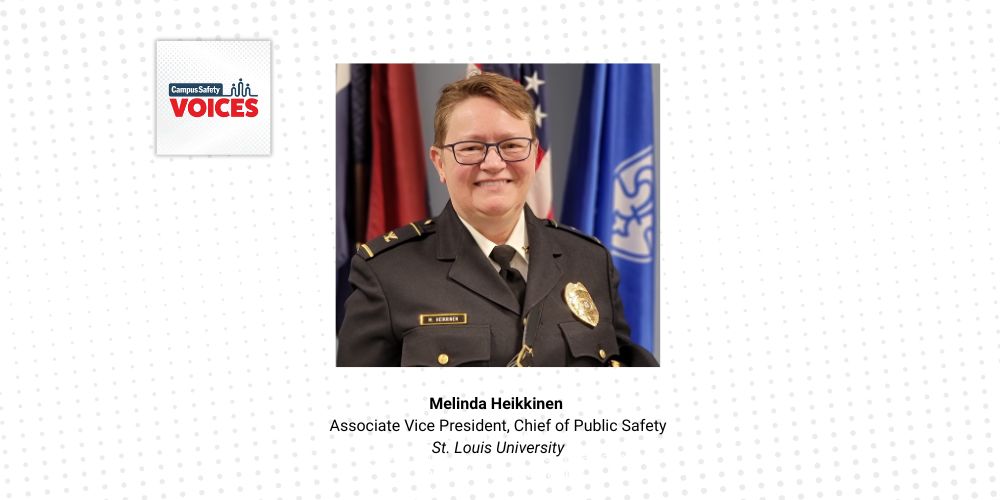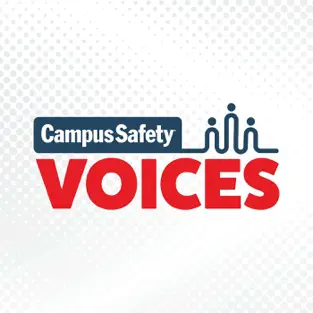Amy Rock (00:00): Hi everyone and thank you for listening to the Campus Safety Voices podcast. My name is Amy Rock. I'm Campus Safety's executive editor and joining me for today's episode is Melinda Heikkinen, Associate VP and Chief of Public Safety at St. Louis University. Melinda is also a 2025 Campus Safety Director of the Year finalist. This is a program of ours that is now in its 18th year, and it recognizes leaders in hospital, university, or school security, law enforcement, or emergency management. So today we're just going to discuss a few of Melinda's endeavors and accomplishments and help that anyone listening can maybe garner some ideas for their own campuses. Now, Melinda, I know your school has a safety app, which provides things such as real-time alerts, emergency contacts, and GPS enabled safety escorts, which is amazing. And your nomination says you were able to improve the app by recognizing some untapped capabilities as well as requirements such as issuing timely alerts that had not been previously applied at your campus. Can you elaborate on this a little bit?
Melinda Heikkinen (01:04): Yeah, I wouldn't say they weren't previously applied, but we needed to enhance them. We had an app that was very basic, and then we decided to transition into one that provided more tools at the fingertips of the students and the faculty and staff. If you work on a college campus, you will hear everybody say, nobody told me, even though 27 emails were sent out or things like that. So what we wanted to do was make sure that those tools and information were at their fingertips. So this app allows them to hit a tile and get basic information for any situation that might occur, push notifications come through it. It just really enhanced our communication, particularly during incidents, but actually at any time on a regular day on campus.
Amy Rock (01:51): Now, I know your nomination also says that you have ensure safety protocols are sensitive to the needs of all students, including those from marginalized communities. Can you share more on this as well?
Melinda Heikkinen (02:03): Yeah, it's really important to us to be seen as a resource and not just a response team so that we're not just about taking your booze out for the Saturday night party in the res halls, but we are an absolute resource. So we made sure that our staff was trained, particularly in mental health first aid and crisis intervention, so that they approached incidents looking for that, if you will. So we know we don't have the same lived experience as many people that we interact with be our campus community or the community surrounding our campus. And it was just really important to make that connection, really listen and follow through and see what's actually happening in front of you before responding to it. And we listened more too. We've made connections with all of those groups to stop and listen, what do you need from us? What are you looking for? And it's really been great. We've had a good time. We've grown our community and we have transitioned quite, we've said a little work to do, but we really are seen here as a resource now. So it was pretty successful program.
Amy Rock (03:11): I mean, there's always going to be work to do, right? I mean, no matter how hard you're working, it's just the name of the game. So now actually wanted to jump back, I'm sorry, to the previous question and ask you, since you guys kind of beefed up the app, do students use it a lot? Is it commonly used? Do they use the safety escorts a lot? Is it something you've spoken to students about that they're like, this is so helpful and makes us feel safe?
Melinda Heikkinen (03:36): Yeah, unfortunately, there's a tradition where you put something out there, you'll hear nothing, but if you take it back, they're yelling. And that's almost the better indicator, which we have not taken it back, but no, but we've presented it. We have a couple of advisory committees that we work with, so we've kind of beta tested it too. And we've asked them for information because we knew generally we weren't going to get a big influx of data back. And they like, yeah, they're like, this is really cool. This is really applicable. And it's not just safety. Commencement week comes up in May. We'll start pushing notifications for information for that too. So I think they see it not just as a public safety tool, but just as a community tool for the campus as a whole. But yeah, people seem to like it and actually they like a lot of the things that we actually want to enhance it one more time. We've got one more tool we can add to it, but that'll be coming up in the future. And everybody seems very responsive to it,
Amy Rock (04:36): And it's good for them to use it not only in emergency situations, just so if one does arise, they're comfortable, they're not opening it for the very first time and being like, oh my gosh, what do I do?
Melinda Heikkinen (04:47): Exactly, exactly. And we teach a variety of classes. We teach, run, hide, fight. We teach a variety of classes around. We always bring it up and it's on our phone. So we're actually showing them how to do that for faculty and staff who might, they may have downloaded it, but that's the last time that they saw it. So it is helpful. And you do see people in the class, they're back there playing with it. So it's kind of nice. It's a fun tool.
Amy Rock (05:13): Sure. And now I know that in your submission it also says that your department has the lowest attrition rate it has had in years despite a staff that is constantly shifting with competition coming from both local law enforcement, particularly the St. Louis Metro police and also the private sector. Do you have any methods or recommendations you've followed or improvements that you've made that you think have attributed to this?
Melinda Heikkinen (05:37): Well, I think there's been two things. One was we really work to become more, as I said before, response team for the community. So the community sees us as more part of, we're not sitting on the outside waiting for something to go wrong. We're an active component of the slew community. But the other piece was creating a where the officers felt valued. That was huge in listening to their needs. We've made some adjustments. My first week here I allowed the men to grow beards. Boy, that was some social capital. So that seems silly, but it's little things like that that speaks to them and that we care about them as human beings too. And that has made a big difference. We've enhanced our training tremendously. We hired in a training manager and we've allowed them to grow their careers. The sounds counterintuitive, but we've even had practice interview panels for those who have said, Hey, I want to go to apply to the local police department.
So we really, again, lifted them up as valued, contributing members, and people are going to leave. We have the police departments are hiring around here, so we're going to lose a few, and we know it, but we're losing 'em to a good thing. So for me, that's good turnover, and they leave feeling supported. We also have about 25 to 30% of people who leave for other reasons within three months have called back and said, can I come back? So again, creating that professional space where they know the work that they do is important. And I think that was the biggest component of us reducing our turnover.
Amy Rock (07:17): It makes sense in the long run, obviously, to support them, even if they're interviewing for another job, because it's your reputation, right? They're coming from your campus and you want to have good rapport with the St. Louis Metro Police so that you guys can work together when you need to. And so it makes total sense.
Melinda Heikkinen (07:35): Currently, we have SLMPD officers responding to assist us or to pick up someone, and they are people who have worked for us before. So that knowledge that they already have in the campus and how we function as a department, it's so helpful to our relationship with them. And we do have a really good relationship with the police department right up to the chief. He and I talk all the time, so it has worked out really well.
Amy Rock (08:03): I'd imagine that police department is massive, which can be harder to make them feel valued just because of sheer numbers. So obviously it's like comparing apples and oranges with a campus police department and a Metro police department, and there's different methods that you have to follow in order to make them feel valued.
Melinda Heikkinen (08:25): Yeah, and to be transparent, we're not a sworn police department. We aren't armed, and we function very much like police department. But the SLMPD recognizes that, and yet they are fully supportive of us in growing what we can do and developing processes that we can take to the next step. Of course, not violating the law, but expanding what they're comfortable with us doing. So that relationship has been critical.




